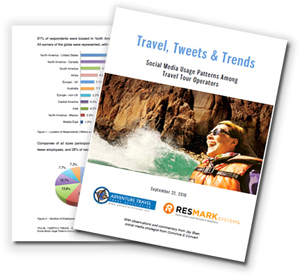The newly released 2013 Adventure Tourism Market Study, produced by the George Washington University (GW) and the Adventure Travel Trade Association (ATTA), estimates the value and provides an updated profile of the adventure travel market.
According to the study, which included three key outbound regions: Europe, North America and South America, growth in the adventure travel market has accelerated at a 65% yearly rate since 2009.
The study estimates the value of the global outbound adventure travel sector to be US$263 billion, excluding airfare, up from US$89 billion first reported in the benchmark consumer study. When this US$263 billion is combined with the estimated $82 billion spent for related gear, apparel and accessories, adventure travelers spent more than $345 billion in 2012 for travel related to adventure.
The GW/ATTA’s market value results reflect the growth in the international tourism market which reached an all-time record of more than one billion international tourism arrivals in 2012, as reported by the UNWTO. Also viewed as a key contributor to this significant growth pattern is the increase in the percentage of European and South American travelers classified as adventure travelers, an increase in the average spending by adventure travelers globally ($593 per trip in 2009 to $947 in 2012), recovery from the global financial crisis, and the emergence of new source markets.
Highlights from the Adventure Tourism Market Study include:
- Adventure travelers are younger than non-adventure travelers, with an average age of 36;
- In 2012 nearly 42 percent of travelers from the three regions reported an adventure activity as the main activity of their last trip (the activity would have been one of those identified in the survey as hard or soft adventure options);
- The average length of a soft adventure trip was ten days in 2012 compared to eight days in 2009;
- Adventure travelers read publications such as National Geographic, National Geographic Traveler and Men’s Health, which cover traditional adventure and recreation topics, as well as unrelated but popular publications such as Cosmopolitan and Vogue;
- Nearly 54 percent of travelers plan to participate in an adventure activity on their next trip, compared to the 42 percent of travelers currently participating in adventure activities. The increase in interest comes largely from soft adventure activities;
- 73 percent of adventure travelers plan to participate in an adventure activity on their next trip. Only 22 percent of adventure travelers plan on doing the same adventure activity as their last trip;
- 45 percent of adventure travelers plan on using a tour operator on their next trip, compared to only 31 percent of non-adventure travelers;
- The percentage of adventure travelers using Facebook (78 percent) has more than doubled since 2009.
Access the Full 2013 Adventure Tourism Market Study





